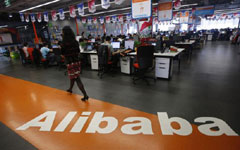Alibaba failed to persuade Hong Kong regulators to accept its governance structure as it sought a listing on the Hong Kong Stock Exchange.
Alibaba's special request to keep a unique shareholder structure, allowing a group of top managers and founders to nominate and control the company's board, violated the exchange's principle of "one share, one vote".
|
 |
|
 |
The proposed US listing is the most anticipated IPO since social networking site Facebook raised $16 billion in 2012. Analysts polled by Reuters have put Alibaba's market value at around $140 billion and the value of the IPO at $15 billion.
The move came just two days after micro-blogging company Sina Weibo filed to raise $500 million via a US IPO. Alibaba holds 18 percent of Sina Weibo's shares.
Ablibaba's announcement of an IPO plan suggested it has fulfilled specific requirements of either the New York Stock Exchange or Nasdaq, Li from Analysys International said.
"The dual-class stock structures, allowed by some US exchanges, can enable insiders to hold the controlling power even after a company becomes public. Companies of such structure issued shares to founders and prioritized investors that have multiple votes," she said.
But adjustments should still be made accordingly if Alibaba wishes to float its shares, Hong said.
"In a typical dual-class structure, the voting weight is subject to changes of its share-holding percentage. However in Alibaba's case, the 28-person partnership will have the absolute right to nominate a majority of the directors, even if their shares are diluted in the future," he said.
Hangzhou-based Alibaba has facilitated online transactions for multinational chain stores and mom-and-pop vendors. Gross merchandise traded on Alibaba reached $240 billion in 2013, while the figure for its equivalent Amazon was $100 billion, according to Forrester Research.
Its payment spinoff, Alipay, offers online saving funds with higher returns and online-to-offline payment solutions.
But such dominance is being eroded by rival Tencent, which rolled out mobile payment services via chat app WeChat and encroached on many services that overlap with Alibaba's portfolio. Analysts regarded the listing as timely since the current valuation may reach its peak level.
"The going-mobile war has just started and it's too early to tell who has a better chance to edge out, leaving investors the opportunity to put a bet on Alibaba," Li said.
But Li Yi, secretary-general of the China Mobile Internet Industry Association, said Alibaba's prospects are not so rosy, as it is short of effective mobile access points.
"It's easy to move from social networking to e-commerce. But the reverse goal, which Alibaba is struggling to do, is hard to achieve," he said.
|
 Check out Chinese tycoons' offices |
 China's 8 most outstanding entrepreneurs |
